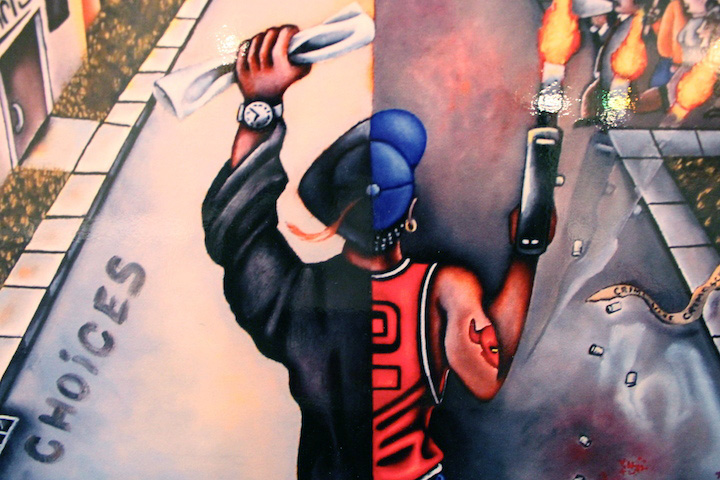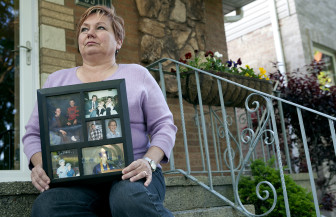
Sanya Mansoor
Addolfo Davis' written reflection is placed next to his artwork: “The first painting shows the split image of a young man who is faced with a choice. A choice our youth are faced with every second of the day. And the sad reality is so many of our youth choose the right side – the side of self-destruction and genocide.”
From the Chicago Bureau:
Sentenced to life in prison at the age of 15, Julie Anderson’s 34-year-old son Eric, along with roughly 80 fellow Illinois inmates, has received his first hope for freedom since he sat in a courtroom 19 years ago.
The U.S. Supreme Court declined on Monday to hear an appeal to the Illinois Supreme Court ruling that applied the national 2012 Alabama v. Miller decision, which banned mandatory life-without-parole sentences for youth offenders, retroactively.

Erik Unger
Julie Anderson, whose son was incarcerated when he was a teenager.
Now about 80 of the 100 JLWOP inmates in Illinois will have an opportunity for resentencing hearings. Most notable is Addolfo Davis, who the Illinois higher court ruled in March’s People v. Davis was eligible for a new sentencing. The U.S. Supreme Court’s actions Monday uphold that ruling.
Davis’ case has become a rallying point for activists fighting JLWOP sentences. In 1990, a 14-year-old Davis took part in a robbery in which two older gang members shot and killed a pair of rivals. Davis, who did not shoot anyone and who had well-documented mental health issues stemming from a childhood of abuse and neglect, was tried as an adult, convicted as an accomplice and sentenced to life without parole.
Activists have pointed to Davis’s actions behind bars as proof that youth can be rehabilitated. In 15 years he earned his GED, wrote a book of poetry and now counsels at-risk Illinois youth.
 But hopes for Davis, Anderson’s son and the rest of Illinois’ JLWOP inmates will be tempered with the knowledge that this is not a mass exoneration, just a first step. The Illinois ruling does not ban life imprisonment, but states that courts must consider “mitigating circumstances” when sentencing youth offenders, including age, home environment and mental development: “the possibility for rehabilitation.”
But hopes for Davis, Anderson’s son and the rest of Illinois’ JLWOP inmates will be tempered with the knowledge that this is not a mass exoneration, just a first step. The Illinois ruling does not ban life imprisonment, but states that courts must consider “mitigating circumstances” when sentencing youth offenders, including age, home environment and mental development: “the possibility for rehabilitation.”
Anderson, who also runs the organization Communities & Relatives of Illinois Incarcerated Children, said the forthcoming resentencing hearings offer a unique opportunity for inmates to prove they’ve grown out of their ways as minors.
“They get a second chance for someone to see ‘are they changed? Have they [been] rehabilitated?' ” she said, hopeful, stating that Davis’ growth is not unique.
She says her son, who was convicted in a murder in 1995, now paints and donates the artwork to fundraisers for organizations that support at-risk youth. Most JWOLP inmates, she said, including her son, are “deeply remorseful,” she said.
Life behind prison walls will still be a potential punishment, both in new cases and in the resentencing hearings. But in the People v. Davis ruling, the Illinois high court argued that under the new guidelines, the circumstances necessitating such a sentence would be “uncommon.” Anderson isn’t sure what to expect now. In October, she said she would be thankful if her son’s term was reduced to 40 years.
Along with Davis, just over 80 of the 100 Illinois JLWOP inmates are now eligible for new sentences.
Since the original 2012 opinion in Alabama v. Miller — heard by the U.S. Supreme Court and finding that mandatory JLWOP amounted to cruel and unusual punishment — the retroactivity of the ruling has been hotly debated in statehouses and courthouses across the country.
Six other state supreme courts — Iowa, Massachusetts, Mississippi, Nebraska, Texas and Wyoming — also extended the ruling retroactively. Four — Louisiana, Michigan, Minnesota and Pennsylvania — did not.
Federal appeals courts have been divided as well, with those in Philadelphia and St. Louis taking the same view as the Illinois Supreme Court, and those in Atlanta and New Orleans coming down against retroactivity.
The incongruity of state and federal rulings, Illinois’ Allan Spellberg argued, necessitated a unifying decision from the nation’s highest court.
Davis’ lawyers contended the Illinois Supreme Court’s decision was an interpretation of state law, and didn’t warrant a federal dispute.
The U.S. Supreme Court’s decision came on the heels of a call by the United Nations Committee Against Torture for all of the United States to end mandatory JLWOP, and urged that those who received such as sentence, “have their cases reviewed by a court for reassessment and resentencing, to restore parole eligibility and for a possible reduction of sentence.”
This story was originally published on the Chicago Bureau's website.
Pingback: Supreme Court Allows Resentencing of Illinois JLWOP Inmates | Chicago Activism